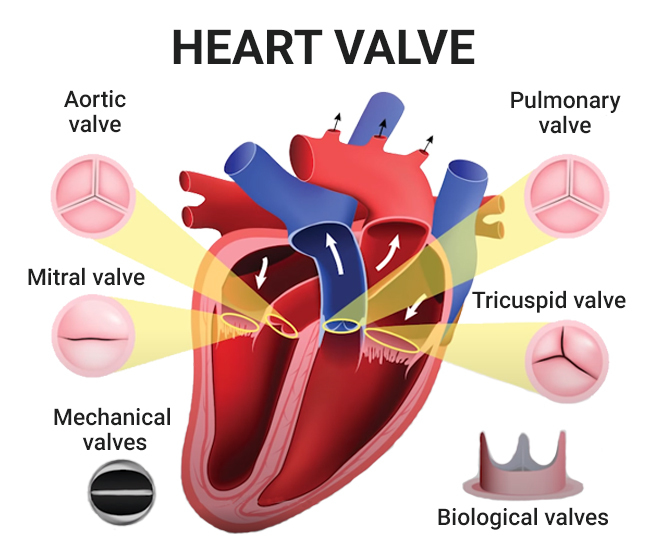Heart Valve Disease Treatment Manhattan NYC
If you experience dizziness, shortness of breath or swelling of your abdomen or feet, these could be signs of heart valve disease. These symptoms aren’t something you should ignore. Untreated, heart valve disease can lead to serious consequences, including heart attack or stroke. If you have any of these symptoms, or if your doctor has detected a heart murmur, visit the best heart valve specialist in NYC at the New York Cardiac Diagnostic Center.

Heart valve disease can lead to a wide range of symptoms and cause several different conditions. The disease itself occurs when one — or several — of the valves in your heart isn’t functioning properly. If you have heart valve disease, you may not always experience symptoms, but if you do, they may include:
- Weakness or dizziness
- Increasing shortness of breath
- Irregular heartbeat
- Unexplained swelling of your feet, ankles, or abdomen
- Sudden weight gain
- Chest pain
Whenever you experience any of the symptoms of heart valve disease, you should find a cardiologist in Manhattan so you can be evaluated. Left untreated, heart valve disease can become life-threatening or at the very least, reduce your quality of life. Your doctor at the New York Cardiac Diagnostic Center provides quick, effective diagnosis and treatment options to either address your heart valves or create a plan to keep you safe.
How Do Valves Work?
Heart valves lie at the exits of each of the four chambers of your heart. They are the mitral valve, aortic valve, pulmonary valve, and tricuspid valve. The function of these heart valves is to keep blood flowing in a single direction through your heart. As long as your valves are working properly, blood is continually moved forward. Heart valves open to let blood flow through your heart and shut to keep it from leaking backward.
The pattern of allowing blood to flow through the valves and then shutting is repeated over and over with each heartbeat. This allows blood to flow continuously throughout your body. It’s vital that these valves remain clear and work properly for you to live a full and vibrant life.
Different Types of Heart Valve Disease
Problems with heart valves can be present at birth or they can develop because of infections, heart disease, or damage caused by an accident or trauma to your chest. Some types of heart valve disease include:
- Heart valve stenosis. When a heart valve doesn’t fully open, the heart has to work extra hard to pump blood through it. This can affect any of the four valves, leading to conditions known as aortic stenosis, mitral stenosis, tricuspid stenosis, and pulmonic stenosis.
- When valve flaps don’t close properly, blood can leak backward into your heart. Also called a leaky valve, this disease can happen to any of your valves. It leads to conditions known as aortic regurgitation, pulmonary regurgitation, tricuspid regurgitation, or mitral regurgitation.
- When one of your heart valves isn’t formed, there’s solid tissue between the chambers. This is a birth defect called atresia. This defect usually has to be resolved through surgery.
Diagnosing Heart Valve Disease
Heart valve disease may be diagnosed by your cardiology doctor after doing a physical examination and evaluating your complaints and symptoms. After listening for a heart murmur, which is a swishing sound that may indicate problems with your heart, your doctor also may run some tests, such as:
- Electrocardiogram (ECG). Your Manhattan cardiologist can use this test to measure electrical impulses from your heart to detect abnormal heart rhythms.
- Echocardiogram. Sound waves are used to produce images of your heart in this test. Your cardiologist can assess your valves to see how well they are working.
- Cardiac MRI. Detailed images of your heart can be created using magnetic fields and radio waves, giving your cardiologist a clear picture of your valves’ performance.
- Cardiac test. Using an exercise test, your New York cardiologists can monitor your heart’s response to physical exertion. While wearing leads attached to computers, you’re asked to walk and run on a treadmill. During your time exercising, your heart activity is recorded, allowing your doctor to tell when and if you have distress. This further supports the final diagnosis.
Read more: https://newyorkcardiac.com/heart-valve-disease
If you have any questions for the best in class NYC cardiologist or would like to schedule a consultation or appointment, please feel free to contact our Wall Street / Financial District Cardiologist`s Office 212-860-5404.
New York Cardiac Diagnostic Center
65 Broadway Suite 1806
New York, NY 10006
212-860-5404
Web Address https://newyorkcardiac.com/
Financial District / Wall Street Office: https://newyorkcardiac.com/best-financial-district-wall-street-cardiologists-nyc
Our location on the map: https://g.page/New-York-Cardiology-Downtown-NYC
https://plus.codes/87G7PX4Q+W2 New York
Nearby Locations:
Financial District / Wall Street
World Trade Center, Two Bridges, Tribeca, Lower East Side
10002, 10003, 10007, 10009
Working Hours:
Monday: 8 am – 5 pm
Tuesday: 8 am – 5 pm
Wednesday: 8 am – 5 pm
Thursday: 8 am – 5 pm
Friday: 8 am – 5 pm
Saturday: Closed
Sunday: Closed
Payment: cash, check, credit cards.
